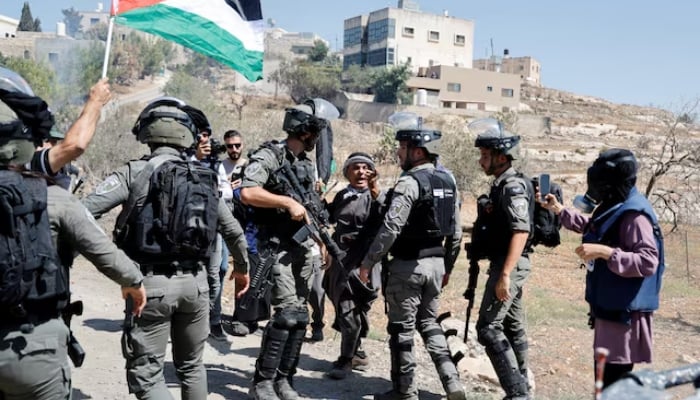The shadow of neo-Zionism
Nowhere has the cost of neo-Zionism been more horrifically visible than in Gaza
June 29, 2025

In a tragic twist of history, the Jewish people, once liberated from Babylonian captivity by a Persian king, now find themselves locked in a destructive confrontation with the heirs of that same Persian legacy: modern-day Iran.
Cyrus the Great, the enlightened emperor of ancient Persia, is still honoured in Jewish scriptures for allowing the exiled Israelites to return to Jerusalem and rebuild their temple. Yet today, the state of Israel, claiming to act in the name of Jewish security, has been trying to wage a devastating campaign against Iran and its allies, with missiles flying, cities burning and diplomacy dying in the smoke.
This is not just another regional war. It is the bloody culmination of an ideological transformation in Israel — the rise of neo-Zionism, a maximalist, religious-nationalist worldview that has turned a once-defensive project of Jewish statehood into an aggressive doctrine of conquest, occupation and preemptive warfare.
Nowhere has the cost of neo-Zionism been more horrifically visible than in Gaza. Since Israel launched its latest operation, dubbed ‘Iron Resolve’, in April 2025, more than 38,000 Palestinians have been killed — over 70% of them women and children, according to UN estimates. Hospitals, schools, mosques and refugee camps have been reduced to rubble. Entire families have been wiped out by bunker-busting bombs in densely populated areas.
The World Health Organisation reports that over 75% of Gaza’s healthcare infrastructure is now non-functional, and famine looms across the Strip. Over 1.9 million people — nearly the entire population — are displaced, with nowhere safe to go.
While Israel cites security threats and Hamas tunnels as justification, human rights organisations, including Amnesty International and Human Rights Watch, have declared Israel’s actions “disproportionate” and possibly amounting to war crimes. Even longtime allies in Europe are beginning to raise their voices, albeit cautiously.
But this time, the war didn’t stop at Gaza. After a direct Israeli airstrike on an Iranian military facility in Isfahan, allegedly targeting nuclear development, Iran launched a historic retaliatory barrage. Over 170 drones and 120 precision-guided missiles targeted Israeli airbases, military facilities, and radar installations. Though Israel’s Iron Dome intercepted many, dozens of missiles struck, causing over 90 Israeli military deaths and hundreds of injuries — the largest single-day military toll for Israel since the 1973 Yom Kippur War.
In return, Israel bombed Iranian infrastructure near Tabriz and Shiraz, destroying an airbase and damaging a petrochemical facility. More than 300 Iranian personnel, including high-ranking officers from the Revolutionary Guards, were reportedly killed. The war has since ceased.
At the heart of this crisis is neo-Zionism — a mutation of classical Zionism that fuses territorial maximalism, religious fundamentalism, and militant nationalism. Unlike early Zionism, which was often secular, neo-Zionism seeks to annex all of historical Palestine, remake the region through military dominance, and assert a theocratic identity over the Jewish state.
Since the 1967 occupation of the West Bank and East Jerusalem, messianic settlers and ultra-nationalists have gained increasing power in Israel. Under the long premiership of Benjamin Netanyahu, and with far-right allies like Itamar Ben-Gvir and Bezalel Smotrich, neo-Zionist policies have flourished. Settlements expand daily. Palestinian resistance is branded as terrorism. And peace talks are treated as obsolete relics of a bygone era.
Iran, with its anti-Zionist ideology and regional alliances, has become the central target of this neo-Zionist worldview — viewed not just as a military threat, but as a civilisational adversary.
Yet despite the war drums, not all Israelis or Jews are in lockstep. For the first time in decades, anti-war sentiment is surging within Israel and the global Jewish diaspora.
In Tel Aviv, over 150,000 people marched on June 1, demanding an immediate ceasefire and an end to settler violence. Prominent Jewish intellectuals and rabbis in New York, London, and Paris have issued joint statements denouncing neo-Zionism as “a betrayal of Jewish ethics and a path to endless bloodshed.”
Within Israel’s own defence establishment, cracks are appearing. Retired generals and Mossad veterans have warned that the doctrine of endless war is “unsustainable” and risks turning Israel into “a pariah state”.
These voices challenge the narrative that criticism of Israel is inherently anti-semitic. On the contrary, they argue, true Jewish values demand peace, justice, and coexistence — not permanent occupation or religious conquest.
The path neo-Zionism offers is not one of safety, but of permanent siege. It traps Israelis and Jews in a state of fear and exceptionalism, where morality is sacrificed for might. It empowers Iran’s hardliners, delegitimises moderates, and pushes the region closer to the abyss. And it burdens the Jewish people with the image of oppressor, coloniser and destroyer — an image that history once reserved for their persecutors.
Cyrus the Great offered the Jews liberation through empathy, tolerance and diplomacy. Neo-Zionism offers them isolation, war and eventual ruin.
Unless the world — and Israel itself — confronts this ideology and its consequences, we may soon find that Cyrus’s gift has been squandered in the shadow of fire and steel.
The writer is an expert on climate change and sustainable development and the founder of the Clifton Urban Forest. He tweets/posts @masoodlohar.
Disclaimer: The viewpoints expressed in this piece are the writer's own and don't necessarily reflect Geo.tv's editorial policy.
Originally published in The News











